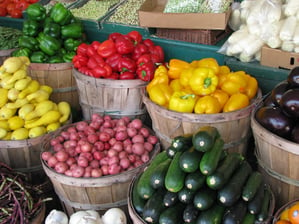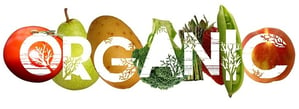 It’s long been known that organic foods taste better and are healthier. Not everyone is familiar with exactly what organic means. “Simply stated, organic produce and other ingredients are grown without the use of pesticides, synthetic fertilizers, sewage sludge, genetically modified organisms, or ionizing radiation. Animals that produce meat, poultry, eggs, and dairy products do not take antibiotics or growth hormones.” The organic food craze has taken hold across the world with more and more consumers only choosing organic options. As customers become more knowledgeable about the food they are eating, it is becoming increasingly important for restaurants to cater to their demands and preferences. The options for organic products are far greater than most may know. As demand has risen, the availability and affordability of these products has increased dramatically.
It’s long been known that organic foods taste better and are healthier. Not everyone is familiar with exactly what organic means. “Simply stated, organic produce and other ingredients are grown without the use of pesticides, synthetic fertilizers, sewage sludge, genetically modified organisms, or ionizing radiation. Animals that produce meat, poultry, eggs, and dairy products do not take antibiotics or growth hormones.” The organic food craze has taken hold across the world with more and more consumers only choosing organic options. As customers become more knowledgeable about the food they are eating, it is becoming increasingly important for restaurants to cater to their demands and preferences. The options for organic products are far greater than most may know. As demand has risen, the availability and affordability of these products has increased dramatically.
Chicken and Beef
Chicken and beef comprise a large number of entrees and main course at most restaurants. Commercially raised chicken and beef are generally given antibiotics and hormones to stave off infections, sicknesses and to increase the amount of edible material. Not only can these be harmful to the animals themselves, it can cause several health issues in the consumer as well. Some antibiotics, even in trace amounts, can cause a lack of germ resistance in humans. Some have even been linked to certain cancers. Organic meats do not contain any of these harmful products. They also generally contain less fat than commercially raised meats. The health benefits of organic meats are a big deciding factor in consumer’s meal choices. Along with these benefits, the flavor of these products can be far superior to those of the mass produced kind.
Vegetables
 If you’re unable to go fully organic with your vegetable selection, it is important that you at least make sure your thin skinned vegetables are organic. Produce such as cucumber, tomatoes, squash and zucchini are of much higher quality when grown organically. Pesticides that are sprayed on mass produced vegetables can penetrate the thinner skinned vegetables more easily affecting their flavor and chemical composition. Thicker skinned vegetables are less susceptible to these invasions; however, whenever possible you will want to go organic with your menu choices. Organically grown may not have as long a shelf life as those grown with chemicals, however, they are far superior in flavor when they are fresh. Organic vegetables can be a big draw to consumers, and certain demographics such as vegetarian or vegan consumers will only partake in organically grown produce.
If you’re unable to go fully organic with your vegetable selection, it is important that you at least make sure your thin skinned vegetables are organic. Produce such as cucumber, tomatoes, squash and zucchini are of much higher quality when grown organically. Pesticides that are sprayed on mass produced vegetables can penetrate the thinner skinned vegetables more easily affecting their flavor and chemical composition. Thicker skinned vegetables are less susceptible to these invasions; however, whenever possible you will want to go organic with your menu choices. Organically grown may not have as long a shelf life as those grown with chemicals, however, they are far superior in flavor when they are fresh. Organic vegetables can be a big draw to consumers, and certain demographics such as vegetarian or vegan consumers will only partake in organically grown produce.
Herbs and Spices
If you’re looking for a place to start to incorporate organic items into your menu, herbs and spices are a great beginning. Since these products are what give your food a distinctive flavor, making the upgrade to organic or even homegrown herbs and spices can place your dishes a step above the competition. Of all of the organic options, this is the easiest to implement. Where they are very simple to grow and take up very little space, they are something you can even grow within the confines of your establishment.
Wine
While organic wine would be on the most extravagant end of the organic spectrum when it comes to cost, it wouldn’t be wise to write it off as unnecessary. “The Environmental Working Group detected pesticides on 86 percent of the imported grapes they surveyed, and 77 percent of grapes were contaminated with two or more pesticides. Closer to home, most California wine grape growers rely on chemicals: Almost 21 million pounds of pesticides were applied on California grapes in 2003 according to the Pesticide Action Network.” Wine offers several different health benefits and the addition of pesticides and other chemicals to the fruit used for them can diminish some of these benefits. Wine connoisseurs can very particular and providing an outstanding product can bring in a large contingent of customers as fine wine trends spread rapidly through their community.
How to get Started
Going organic can be expensive to begin with, however, the business you bring in and the premiums you can charge for these products can drastically increase revenue restaurant. Making the transition sooner rather than later can be key to the survival and prosperity of your business. Quikstone Capital Solutions works closely with restaurant owners to improve their business and support their advancement. Consider a merchant cash advance to grow your organic initiative.





